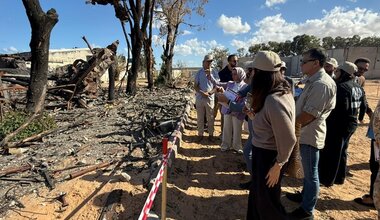UNSMIL joins GNA’s Women’s Empowerment Unit in congratulating Libyan Women on International Day of Women and Girls in Science
Science and gender equality are both vital for the achievement of the international development goals, and the 2030 Agenda for Sustainable Development. Over decades the UN and the international community have made great efforts in inspiring and engaging women and girls in science.
Biases and gender stereotypes steering women and girls away from science related field, thus we have fewer women biologists, physicists, Mathematicians and engineering professionals.
Yet women strive to surmount and participate in the science field, and they have made huge success overtime. The Libyan women are no exception and today the United Nations Support Mission in Libya (UNSMIL), with the women’s Empowerment Unit at the Government of National Accord (GNA), celebrate the achievements of the Libyan women, represented by four women scientists and pioneers in their fields.
UNSMIL will work hand in hand with the Libyan women to create more venues for their progress and development and to support and achieve the agreed development goals including the 2030 agenda for sustainable development.
UNSMIL congratulates all Libyan women on the International Day of Women and Girls in science, and commemorate them for their scientific achievement.
We congratulate Ms. Nagat Elsadig, member of the British Royal fellowship in Clinical Biochemistry, Dr. Fatin Abdulhameed the first dean of the faculty of Medicine at Tripoli University, Ms. Rania Rahoma, Aviation engineer, and Dr. Khiryia Ohida, the professor at the university of Sirte and who was awarded The World Award 2020 on oncology and Medicine, for their sound contribution to science and their efforts to stimulate other women to join and prosper in the science field.
UNSMIL will continue to support Libyan women, encourage and empower Libyan women who are leading innovation, science and development. The Mission will continue to promote the actions to remove all the barriers that hold women back, based on our strong belief that the prosperity of the Libyan society depends on advancing the sound contribution of the Libyan women, including in science.
 United Nations Peacekeeping
United Nations Peacekeeping UN
UN









